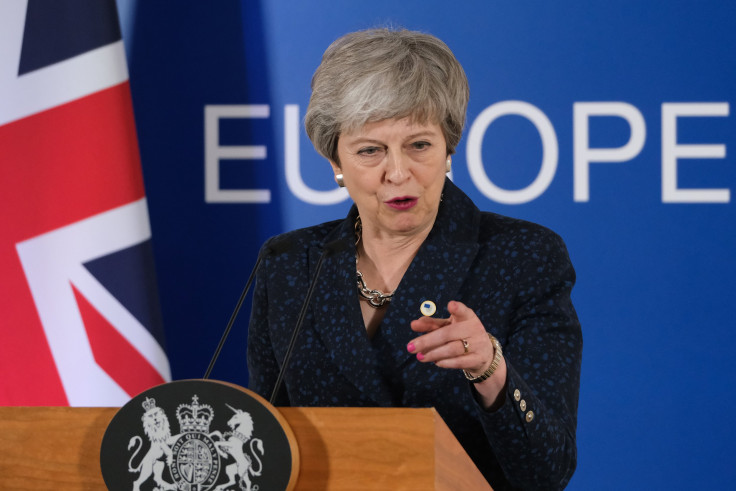Theresa May To Resign? Could Announce Departure By Wednesday Despite Opposition Split

British Prime Minister Theresa May is likely to resign after Parliament seized control of the Brexit process and her own deal has few takers.
According to reports, May will address her party lawmakers on Wednesday and unveil a timetable for her departure in the last round effort to secure support for her twice-rejected Brexit deal in Parliament.
May’s refusal to hear MPs' opposition on her withdrawal agreement and the bid to push the deal for the third time has increased anger and frustration on all sides.
Now the core of Brexit news is May’s determination to get her deal approved by Commons despite the slimming support in the cabinet and party.
That came into the open display on Monday when Ministers from pro-and anti-Brexit camps in her cabinet joined rebel Conservative MPs in defying the government whip and supported an opposition-backed motion that seized control of Brexit process away from the May government.
That Oliver Letwin who moved the amendment is a member of May’s Conservative Party reflected the factionalism within May’s camp and in U.K. politics.
The Prime Minister was embarrassed when three government ministers quit on Monday and backed the opposition amendment.
Game changer amendment and indicative votes
The passing of the Letwin amendment on Monday was a game changer and gave lawmakers an upper hand to set the agenda for debate and to explore alternative Brexit outcomes, other than what May has prescribed.
On Wednesday, MPs will hold a series of votes on different Brexit outcomes.
This is a power shift away from the government and makes MPs the masters of Brexit outcome and the U.K.’s relation with the EU.
These “indicative votes” will find out what EU exit deal Parliament can finally vote through.
Since these votes are non-binding, the government can still ignore the results. May has already indicated that there is no guarantee she will abide by their wish in indicative votes.
MPs will vote on various options
· May’s withdrawal deal
· U.K.’s membership of the EU’s single market
· UK in the EU customs union
· No-deal Brexit
· Canada-style free trade agreement
· Second referendum
· Scrapping the Brexit altogether
Dramatic developments may win supporters for PM May
Meanwhile, the Eurosceptic faction of Conservative MPs who had been opposing Theresa May’s Brexit deal split on Tuesday with its leader Jacob Rees-Mogg offering support to May’s withdrawal agreement.
Rees-Mogg, leading the pro-Brexit European Research Group, said unless MPs rally behind the May deal, the result would be Britain remaining tied to the EU.
Mogg’s move sent out a warning signal to the predominantly pro-Remain parliament that is in control of the Brexit process now and seeking alternatives to May’s deal.
In a tweet, Rees-Mogg said the “choice seems to be Mrs. May’s deal or no Brexit.” The new stand contrasts his group ’s past role in defeating May’s deal twice in the House of Commons.
“Is this deal worse than not leaving?” he asked in a podcast. “No, definitely not. If we take this deal we are legally out of the EU . . . It restores our independence.”
It is becoming clear, mostly Conservatives pro Leavers might get unexpected support from such dramatic developments. The new scenario can be PM May stepping down or she staying on after being convinced that MP will ultimately vote for her deal to avoid the slow Brexit and making Britain join European parliament elections.
An indication of last-minute support to May’s deal was evident in the subtext of former foreign secretary, Boris Johnson’s words.
Johnson told the BBC that there was “no point in supporting Mrs. May's deal without the U.K. changing its approach in phase two of the negotiations.” Else, the country would be indefinitely locked into the rules of the EU.
But Johnson's point, “if the PM promises to go soon, then she might get my vote” was unmistakable on extending the last minute support.
As of now, Britain will have to move out of the EU on April 12 in case May's deal fails in the parliament and no alternate proposals emerge that are palatable to the U.K government.
© Copyright IBTimes 2024. All rights reserved.





















